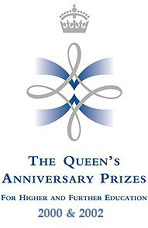The University of Greenwich has received a prestigious Queen's Anniversary Prize for Higher and Further Education for its work on 'Food Security in the Developing World.' This national award recognizes outstanding achievement which also benefits the wider community.
The Prize has been won by the University's Natural Resources Institute (NRI), whose food systems experts work with partners in the developing world on processing, conservation and marketing of food supplies. A distinguished panel of judges commended NRI, saying that its work "in the field of sustainable food security is of international renown." Their citation states that NRI's "practical projects together with its educational and training programmes have brought huge benefit, making a real difference to the lives of thousands of people in developing countries and ensuring that its multidisciplinary expertise is shared widely."
In an honours ceremony in the Grand Ballroom at Buckingham Palace on 16 February 2001, the Queen presented the Gold Medal to the Vice-Chancellor, Professor Rick Trainor, while the leader of the food security team, Professor Chris Haines, received the Prize Certificate from the Duke of Edinburgh. Also present were Lord Holme of Cheltenham (the University's Chancellor), Professor John Perfect, Mr John Conway and five of NRI's PhD students studying with the winning team. In the subsequent Reception in the Picture Gallery, the Queen made a special point of talking to our postgraduate students individually about their research, while the Duke was particularly interested in discussing the University's development of its latest campus at Greenwich Maritime in the former Royal Naval College.
The winning project included innovative low-cost solutions to problems faced by hundreds of thousands of small-scale farmers and food processors around the globe - from new uses for cassava flour in preparing local snack foods, to organic replacements for expensive pesticides. In Colombia, over 6000 villagers have received 'cascade' training from the team, learning new ways to protect and market their harvested fruit and vegetables; in Mozambique, the team is developing strategies to deal with rat infestation in rural villages; and in East and West Africa, the team has been working for several years to improve control of the larger grain borer, a beetle pest that can reduce maize grain to dust.
NRI staff working on food security issues cover an unrivalled range of disciplines and skills - from entomology and horticulture to social sciences and food technology - and have a unique network of partnerships throughout the developing world, including government institutions, aid agencies, the private sector, and major players such as DFID, WHO, and the World Bank. Members of the winning team are proud to have won this higher education Prize within five years of joining the University, which can now use the highly-regarded Prize logo for four years on its publications, in its correspondence, on its website and on its official vehicles.


